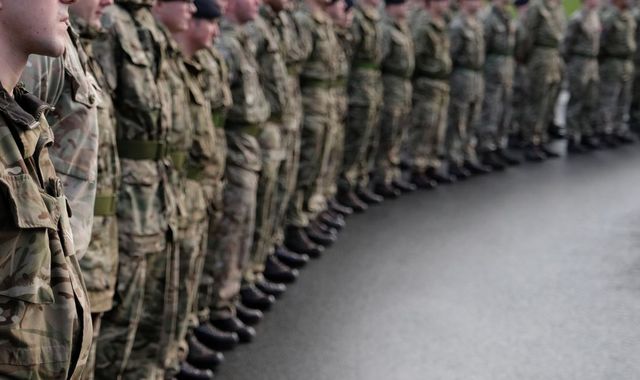Coronavirus: Britain could see biggest mobilisation of military since Iraq war
Written by News on 25/03/2020
Britain’s fight against the coronavirus could see the biggest mobilisation by the armed forces since the 2003 Iraq war.


Military units around the country are looking at what contribution they could make – if requested – to slow the spread of the disease, boost the capacity of the NHS to care for patients and help ensure vital supplies reach people stuck at home.
In total, more than 20,000 servicemen and women are on standby and “there are many more to come behind that if necessary”, General Sir Mark Carleton-Smith, the head of the army, said in a social media message at the weekend.
They will comprise regular troops and reservists.
More than 700 military personnel are already deployed as part of what is being called the COVID Support Force. Their tasks include:
- Helping the NHS to turn the sprawling ExCel exhibition centre in London into a 4,000-bed hospital facility for coronavirus patients
- Scoping out sites across the country that could also be turned into makeshift hospitals
- Working with “local resilience forums” to prepare their response to the outbreak
- Training to drive oxygen tankers for the NHS
- Helping to transport protective equipment like face masks to hospitals
General Sir Nick Parker, a former Commander Land Forces, headed the military effort to secure the Olympic Games in London in 2012 in support of the government – an operation that required close to 20,000 service personnel but only lasted a few weeks.
He said the armed forces today would be “leaning into the challenge” posed by COVID-19, the disease caused by the coronavirus.
:: Listen to the Daily Podcast on Apple Podcasts, Google Podcasts, Spotify, Spreaker
“Normally the military is the lead against the enemy,” Sir Nick told Sky News.
“Here you have this rather bizarre situation where the NHS are in the frontline and the military is one of your essential components to provide the essential support to get through it.”
The armed forces “are very good at making rapid analysis of complex problems”, he said.
“What I would expect to happen now is for quite a strong military command spine to emerge across the country, coordinating between the local resilience forums and central government to enable the non-NHS things to be coordinated.”
There is also an important role for the voluntary sector, according to Sir Nick.
He is on the board of directors for Team Rubicon, a charity that has a network of former service personnel and other emergency relief experts ready to provide disaster relief anywhere in the world, including in the UK.
“There will be a significant, spontaneous, volunteer offer from the ex-military community,” Sir Nick said.
“We are working hard at the moment to get a foothold because we do believe we have got something to offer.”
General Sir Richard Barrons, another top former commander, also believes that volunteers have a vital role to play in the UK’s response to the coronavirus outbreak, not least because of the limited size and strength of the armed forces.
“The national resilience capacity is not in the military it’s in civil society,” he said.
“We think the armed forces are the saviour but actually it is mobilising the capacity of civil society. That is the key strategic issue it is about building capacity in civil society.”
There will still be a prominent and important role for the army, Royal Navy and Royal Air Force, which is being coordinated by the Standing Joint Force Headquarters in Aldershot.
The mission to support the UK at home has been code-named Operation Rescript.
A parallel coronavirus mission to support the UK overseas – including British military deployments abroad and the UK’s Overseas Territories like the Falkland Islands – has been named Operation Broadshare.
It is understood that of the nearly 20,700 soldiers, sailors, airmen and Royal Marines on standby to mobilise in support of the coronavirus crisis, more than 2,000 personnel are on 24 hours’ notice to move and 1,500 are being put on 48 hours’ notice to move.
Security officials are alert to the possibility that the UK’s adversaries, including Russia, could be monitoring the impact of the virus on Britain and its allies to observe vulnerabilities that could potentially be exploited.
At the same time as responding to the pandemic, the Ministry of Defence must ensure operations vital to the UK’s national security are not compromised by the virus.
This includes maintaining a nuclear-armed submarine permanently at sea, counter-terrorism troops at readiness to respond to a terrorist attack and RAF fast jets poised to scramble in response to a threat to the UK airspace.
Key operations overseas must also continue, including a deployment to Estonia, where hundreds of British troops are part of a NATO mission to deter Russian aggression.
British forces are also in Afghanistan, Iraq and elsewhere. The Iraq mission is being scaled down because the coronavirus means efforts to train Iraqi security forces had to be put on hold.
Servicemen and women on vital operations are being kept in isolation or quarantined for 14 days to ensure they do not catch the disease or do not have the disease.
But there is an expectation that across defence up to 20% of the workforce could be unable to work at the peak of the pandemic.
Back in 2003, some 46,000 servicemen and women were involved at the peak of the operation when Britain joined the United States in its invasion of Iraq.
(c) Sky News 2020: Coronavirus: Britain could see biggest mobilisation of military since Iraq war







